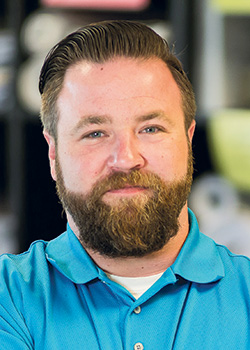Eleven years ago when Luke Green began his career working part-time in Rapids Wholesale Equipment’s warehouse while attending college, he didn’t realize the potential before him.
 But after remaining with the company and advancing, first to the installation department, then as the warehouse’s assistant manager before moving to the contracts department and, finally, in 2011 to the sales position he coveted, Green realized he was exactly where he wanted to be.
But after remaining with the company and advancing, first to the installation department, then as the warehouse’s assistant manager before moving to the contracts department and, finally, in 2011 to the sales position he coveted, Green realized he was exactly where he wanted to be.
“This began as a job to make additional money during college, but I liked the company and owners so much, I began envisioning where I could be in 5 to 10 years,” says Green. “Then I stepped into a sales position and started building my book of business.”
Green works with a variety of clients, from B&I and schools to independents and chains.
FE&S: What did working in the warehouse and in installation teach you?
LG: I have a very fine eye for detail and installation due to hands-on experience [that] most sales people do not have. I’ve dealt with the hardships of installations, which has helped me evolve into a better sales person overall.
FE&S: You work with a lot of complex projects. What’s the key to making them a success?
LG: Being very detail oriented, proactive and preplanning is important as well as being on-site when I need to. This helps ensure it all goes smoothly.
FE&S: How do you coordinate complex projects?
LG: A lot of how I approach projects comes from my knowledge of installation and knowing what works and what doesn’t — for example, making sure we have proper access into the building for large equipment. Also, the coordination between owners, contractors and subcontractor is key. We always have a pre-installation meeting, which details the steps everyone needs to take prior to us being on-site. It’s not just about the foodservice; the entire project needs to be considered.
FE&S: When something does not go as planned with a project, describe your approach to rectifying the situation.
LG: My approach varies, as it’s on a case by case basis. Overall, it’s important to step up and take ownership of the situation, then rectify it as quickly as possible.
FE&S: What goes into writing a good spec?
LG: Listening to the customer’s wants and needs is important. There’s always the political game of working with the factories and choosing the equipment, but it has to be the right fit for the customer. Operators pay for a good design once and pay for a bad design for the rest of their life.
FE&S: You also work with a local college’s culinary arts program, correct?
LG: Yes. I attend a class at the beginning of each semester as a guest speaker and explain the importance of a DSR, what I do day to day, and walk them through the beginning stages of opening a restaurant. I share some ideas/regulations they need to consider and some horror or funny stories I have accumulated over the years. At the end of the semester, I come back and listen to their “sales pitch” for their anticipated restaurant. I always make myself a resource to answer any questions during, and after, their duration at college as well as share job openings I am aware of.




